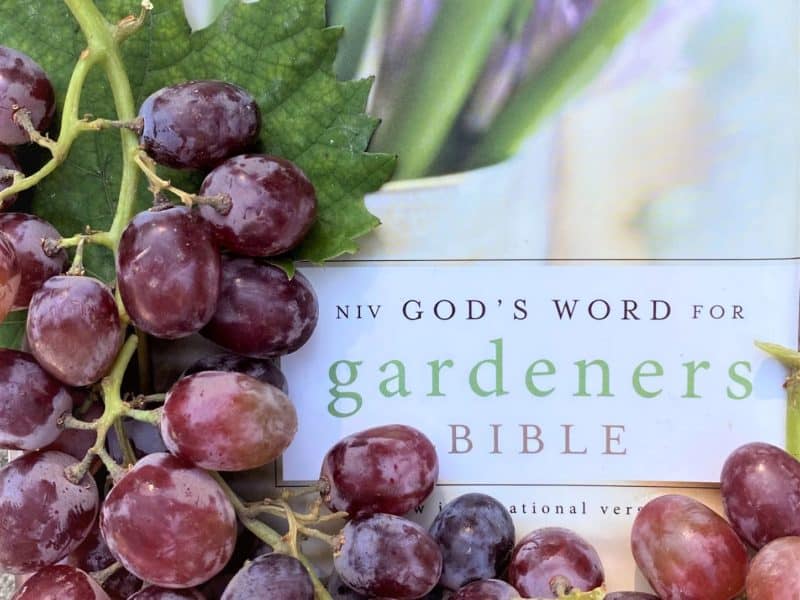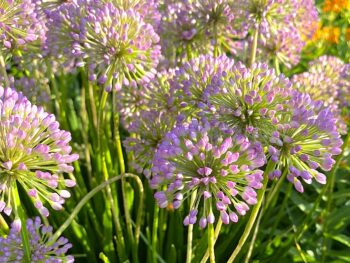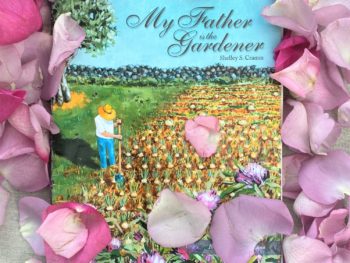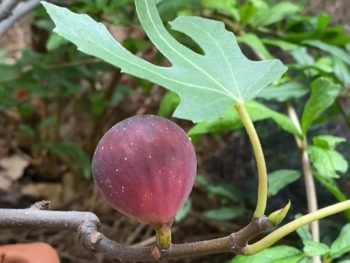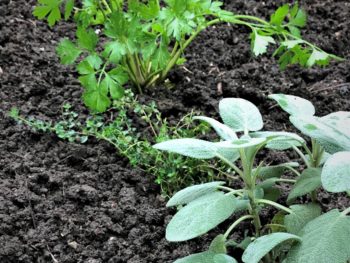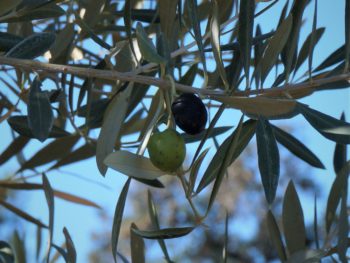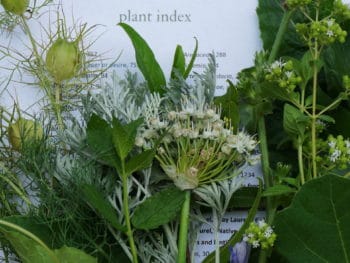Blessings to your Resurrection week! Enjoy this excerpt from NIV God’s Word for Gardeners Bible, the first of a week’s readings from Away from the Last Supper reflecting on Jesus’ intimate words to his followers.
“Grapevine’s Intertwined History”
I am the true vine.
~John 15:1 NIV
Read: John 15:1
Embellish the Story: Genesis 49:22; 50:16 – 21; 1 Thessalonians 5:16 – 18
In using the grapevine as a metaphor, Jesus not only sharpened his disciples’ understanding of events to come, but drew upon a rich, deep heritage of the grapevine analogy in Israel’s history. Vitis vinifera, the grapevine, a member of the Vitaceae family, is a hardy and long-lived plant, extending roots deeply into most soil types. Preferring a Mediterranean climate with early spring rains, and little moisture on the flowers and fruits as they mature over summer, the vine will grow vigorously for generations. (1)
The grapevine pictures the establishing of a household’s prosperity, its nourishment, blessing and forgiveness intertwined throughout the Old Testament. Its particular characteristics of vivacity and need for pruning are vital in understanding God’s ways.
Grapevines are so full of enthusiasm and eagerness to grow that this is only the beginning — never let them let the upper hand; let them know from the very start that you are the boss. An annual pruning is essential and will maintain them in good health and vigor.
— Louise Riotte, Growing Grapes and Berries, 1974
In Genesis we read that Joseph had the favor of his father Jacob over his sister and twelve brothers (Genesis 37:3). His father’s adoration grew Joseph’s confidence bordering on comeuppance. When he dreamed that his older siblings were bowing down to him, he used no discretion in telling them so (Genesis 37:5). He displayed “enthusiasm and eagerness,” noted by Louise Riotte in Growing Grapes and Berries, intrinsic to the grapevine. It would take many years and many pruning events — being sold into slavery (Genesis 37:28), thrown into prison (Genesis 39:20), and appointed to huge administrative responsibilities (Genesis 41:40) — to cut back and shape his ambition. Yet at the end of his life, Joseph bore the fruit of such pruning: Wisdom, humility, kindness, forgiveness and deep love of his family. Eventually, he did rule over his older brothers, a wise, benevolent and prudent leader.
Joseph was a fruitful vine,
Genesis 49:22 NIV
his father pronounced in his dying blessing.
Joseph’s forgiveness of his family foreshadows Jesus’ ultimate act of forgiveness; in the dark shadows of the crucifixion eve, moving away from the last supper, Jesus alluded to this great ancestor of forgiveness through the grapevine metaphor. In doing so, he prepared the disciples to endure his impending injustice and the trauma of losing their leader with the trusting wisdom that Joseph had spoken, as if to say, Remember, my friends, my Father will use what is intended to harm me for good, to accomplish what is now being done, the saving of many lives (Genesis 50:20).
©Shelley S. Cramm, from NIV God’s Word for Gardeners Bible
(1) Sources for the study of grapevines and viticulture include:
Bush and Son and Meissner, Illustrated Descriptive Catalog of American Grape Vines (St. Louis, MO: R. P. Studley, 1883), reprinted by Keesinger, Legacy Reprint Series, LaVergne, TN
T.H. Everett, editor, New Illustrated Encyclopedia of Gardening (New York: Greystone, 1960), 5:784 – 95
Louise Riotte, Growing Berries and Grapes (Dallas: Taylor, 1993), 111 – 28
Lon Rombough, The Grape Grower (White River Junction, VT: Chelsea Green, 2002),
who led me to T. V. Munson, Foundations of American Grape Culture (New York: Orange Judd, 1909)
Thank you to Delaney Vineyards for a personal visit and view of vineyards, April 2011, 2000 Champagne Blvd., Grapevine, TX, 76051, or www.delaneyvineyards.com.
For more information on growing grapevines in your garden, visit our Plant Guide: Grapevine – Garden In Delight

